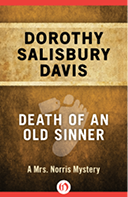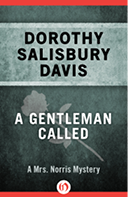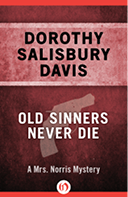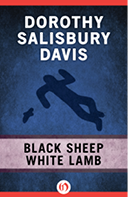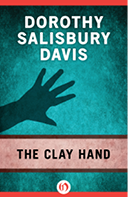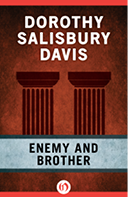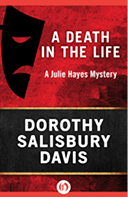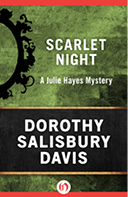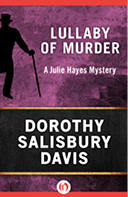Authors: Dorothy Salisbury Davis
Pale Betrayer (25 page)
Anderson cleared his throat. “I can see that you feel the same is true of me at this moment.”
“You have the clandestine microfilm in your possession now, don’t you?” Redmond asked. His face showed the lines of weary tension.
“Yes. I can tell you now that we do have it. We were not playing cat and mouse with you, Captain, as I’m pretty sure you and Marks thought.
“The point at which the Bradley case became significant to us occurred Wednesday morning. The State Department passed along the intelligence that Vassil Grysenko had been arrested shortly after his return to the Soviet Union, charged with Stalinist activity. We were with you from then on, and sometimes, forgive me, ahead of you.
“When your investigation veered toward Corrales, it opened up the whole vista to us. Because of his political activity, we had kept a close check on Dr. Corrales’s travel plans. We did not interfere, we just watched. He had booked flight to Mexico for Tuesday morning, and at midnight Monday, he canceled that flight. As soon as you tied him into the Bradley case, we wanted to know why he had changed his plans. As Captain Redmond suspected, he had simply found another, safer way, he supposed, to transmit the microfilm—the fortuitous burial plans for an all-but-forgotten revolutionary. The shroud, as I needn’t tell you, is an ancient hiding place for small treasure.
“It was most important to United States interests—I might say to world interests—that the microfilm brought from Athens
appear
to go over the border. Sufficiently convincing film was substituted in the casket, and it did go over the border at 7:05 last night.
“The microfilm which came in with Bradley does indeed contain vital, secret Soviet information—information on how to produce high-energy explosives. It probably contains nothing we have not ourselves achieved, but you see, gentlemen, it was destined for a Chinese Communist courier.
“Dr. Corrales has posed from the early days of Castro’s Cuban take-over as an anti-Castro man. And perhaps he is—in the larger scheme of things. That will depend on which side Castro is on if it comes to a showdown between Soviet and the Chinese-Stalinist Communism. But in bringing him to trial,” Anderson glanced at the district attorney, “you will undoubtedly gain sympathy in his having betrayed the anti-Castro movement.”
“Do you think we will need sympathy, sir?”
“In the absence of powerful evidence, it is possible. Yes.”
“Mr. Anderson,” Marks said, “do
you
believe that Dr. Corrales murdered Bradley?”
“I should say it is extremely likely. But we must not underestimate the significance of their diversive tactics. In order to see my point, you must try to understand the working of such minds: they cover themselves and cross-cover, and sometimes use a third highly developed alternative. They protect themselves, perhaps above all else, against one another. Certainly against a man whom they had converted as easily as Mather. Miss Russo was the keystone of their first cover. May I remind you of the headlines Tuesday morning: ‘Physicist Murdered Near Apartment of Attractive Student?’”
Anderson moistened his mouth with the last of his coffee and went on: “It must have been in their plans from the beginning that Dr. Bradley would die. But not until they knew whether he had brought the microfilm they expected. He had to live long enough to be available to them for questioning and the lumberyard was the ideal place for such questioning. He would have died in any case.
“I very much doubt that Corrales tried to view the microfilm there. He would not be trained in its evaluation. He simply went there to make sure the film had come through, that it was in the box. If it had not been, Bradley would have been brought to the lumberyard and cross-examined. Perhaps Corrales himself will clarify some of these things. But I doubt it.”
“He’s not even mentioned in Mather’s confession,” Fitzgerald said.
“Undoubtedly because Mather had no knowledge of his existence, much less his complicity. And if it had not been for a little key to a padlock—and a routine photograph in the F.B.I. files of an anti-Castro demonstration, you might have difficulty in bringing him to trial. I understand he built himself a solid alibi for the night of the crime.”
“You underestimate a couple of young detectives on my squad when you say that,” Captain Redmond said. “I think Herring and Pererro can break that alibi, given time.”
“I deeply hope that is so,” Anderson said. “And that, by the way, is all we ask also—a little more time. You see, Dr. Corrales is not aware that the microfilm he took from Bradley has been intercepted. He still believes his mission was accomplished. Tuesday morning he telegraphed Mexico City that business here detained him. He detailed what he had hoped to accomplish by that trip to Mexico: it reads like a legitimate précis of anti-Castro activity. We have not yet broken the code beneath that message, but it is to be supposed it directed his contact to the casket of the old gentleman sent home for burial. We may even have to wait for the next move to come from the midnight ravagers of the grave. But when it comes, our people are prepared. There is no telling of course how deeply within the ring this will lead: before the film itself is evaluated at its true worth, it may pass through a number of hands, some quite as lethal as Dr. Corrales. That is something you and I, gentlemen, are unlikely ever to know. In fact, from the moment the casket crossed the border, I became no more than Stateside liaison. But as that liaison, I now ask you to delay, for the time being at least, disclosure of our possession of what we may call the shrouded film—the film Corrales concealed in the casket.”
“But, Lord God Almighty,” Fitzgerald exploded, “we have to arraign the man within twenty-four hours. What do we use as motive?”
Anderson waited a moment. Then he said quietly: “Why not this—for the arraignment?” He picked up a copy of Mather’s confession. “There was a sort of latent decency in this poor bastard. He deserves to have been of some use to his friends and country. You will have ample time to prepare then for the Grand Jury.
“And you may just find yourselves with an easier case ultimately, for having used it. Corrales, you see, may admit to participation in a ‘conspiracy’ such as Mather describes here. The details are familiar to him—and to him it would represent the perfect protection for the microfilm he now believes on its way to the Eastern World.”
The latent decency … It was a phrase that haunted Marks throughout the night. He found himself, leaving Anderson’s lower Fifth Avenue apartment shortly after ten o’clock, walking south alone. He wanted to call Anne Russo, but he didn’t: only Anne would know that Janet cared enough for Mather to suffer a new bereavement with his death. But it was something she would have to suffer through. And his own desire to see Anne again would also have to wait for days to pass, perhaps weeks, until the final story could be told.
He did not go into the Red Lantern, passing it, but he went into the bar across the street and ordered a double Scotch, and wondered while he drank it if the Edwardians were still disputing Sweeney’s presence among the nightingales.
Dorothy Salisbury Davis is a Grand Master of the Mystery Writers of America, and a recipient of lifetime achievement awards from Bouchercon and Malice Domestic. The author of seventeen crime novels, including the Mrs. Norris Series and the Julie Hayes Series; three historical novels; and numerous short stories; she has served as president of the Mystery Writers of America and is a founder of Sisters in Crime.
Born in Chicago in 1916, she grew up on farms in Wisconsin and Illinois and graduated from college into the Great Depression. She found employment as a magic-show promoter, which took her to small towns all over the country, and subsequently worked on the WPA Writers Project in advertising and industrial relations. During World War II, she directed the benefits program of a major meatpacking company for its more than eighty thousand employees in military service. She was married for forty-seven years to the late Harry Davis, an actor, with whom she traveled abroad extensively. She currently lives in Palisades, New York.
All rights reserved, including without limitation the right to reproduce this ebook or any portion thereof in any form or by any means, whether electronic or mechanical, now known or hereinafter invented, without the express written permission of the publisher.
This is a work of fiction. Names, characters, places, events, and incidents either are the product of the author’s imagination or are used fictitiously. Any resemblance to actual persons, living or dead, businesses, companies, events, or locales is entirely coincidental.
Copyright © 1965 by Dorothy Salisbury Davis
Cover design by Tracey Dunham
978-1-4804-6052-2
This edition published in 2014 by Open Road Integrated Media, Inc.
345 Hudson Street
New York, NY 10014


